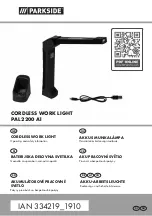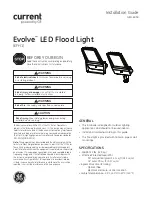
4
DISPLAY
The control board offer several features: you can simple set the starting address,
run the pre-programmed program or make a reset. The main menu is accessed
by pressing the
Mode
-button, browse through the submenu by pressing
Up
or
Down
.
Press the
Enter
-button in order to select the desired menu.
You can change the selection by pressing
Up
or
Down
. Confirm every selection
by pressing the
Enter
-button.
You can leave every mode by pressing the
Mode
-button. The functions provided
are described later in this manual.
DMX-512 CONNECTION
If you are using a standard DMX controller, you can connect the DMX-output of the controller directly to the DMX-input of the
first unit in a DMX-chain. Always connect the output of one unit with the input of the next unit until all units are connected.
If you use a controller with 5 pin DMX connection you will need to use a 5-pin to 3-pin adapter.
At the last fixture, the DMX cable has to be terminated. Solder a 120 Ohm resistor between signal (-) and signal (+)
into a 3-pin XLR connector and plug this into the DMX output of the last fixture in the chain.
MASTER/SLAVE OPERATION
The master/slave operation enables that several same units can be controlled by one “master” unit.
Connect the first unit “DMX OUT” socket with the second unit “DMX IN”, using a 3pin DMX Cable. Repeat this process with the
third, fourth etc. or see a above section “DMX-512 connection”. Choose the unit that will control all other and set this in master-
mode via display. The other units that must react on the master, you must set in slave-mode. The “Slave” will synchronously
follow the “Master” .
Noted:
Any unit can be the “Master” or “Slave”.
REPLACING THE FUSE
If the fuse is defective, replace the fuse with a fuse of the same type and value. Before replacing the fuse, unplug mains lead.
Procedure:
Step 1: Open the fuse holder on the rear panel with a fitting screwdriver.
Step 2: Remove the old fuse from the fuse holder.
Step 3: Install the new fuse in the fuse holder.
Step 4: Replace the fuse holder in the housing.
FIXTURE CLEANING
The cleaning of internal and external optical lenses and/or mirrors must be carried out periodically to optimize light output.
Cleaning frequency depends on the environment in which the fixture operates: damp, smoky or particularly dirty surrounding
can cause greater accumulation of dirt on the unit’s optics.
Make sure the area below the installation place is free from unwanted persons during servicing
Housings, fixations and installations spots( ceiling, truss, suspensions) should be totally free from any deformation
The mains cables must be in impeccable condition and should be replaced immediately when even a small problem is
detected
In order to protect the fixture from overheat the cooling fans (if any) and ventilation openings should be cleaned
monthly.
The interior of the fixture should be cleaned annually using a vacuum cleaner or air-jet.
Clean with soft cloth using normal glass cleaning fluid.
Always dry the parts carefully.
Clean the external optics at least every month. Clean the internal optics at least every 30/60 days.
ATTENTION:
We strongly recommend internal cleaning to be carried out by qualified worker!





































